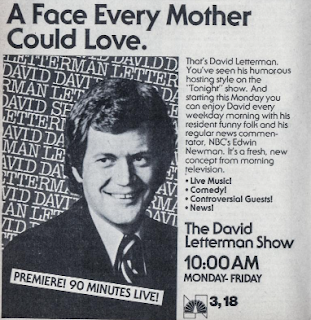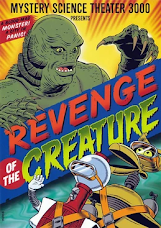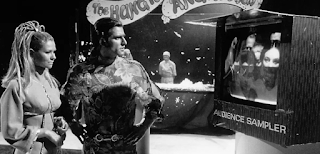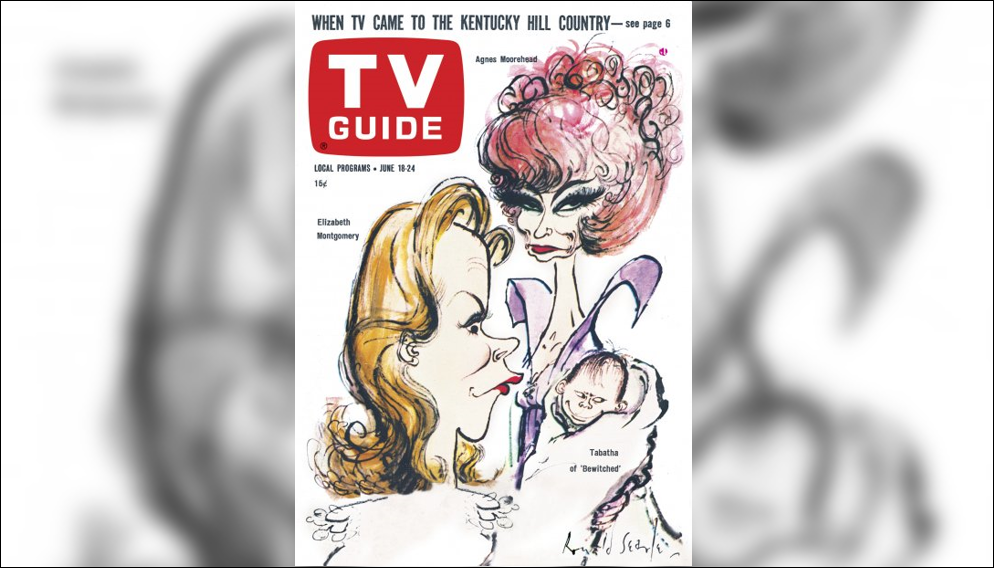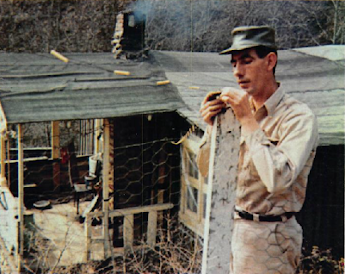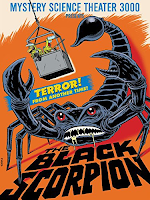[Aldous] Huxley and [George] Orwell did not prophesy the same thing. . . What Orwell feared were those who would ban books. What Huxley feared was that there would be no reason to ban a book, for there would be no one who wanted to read one. Orwell feared those who would deprive us of information. Huxley feared those who would give us so much that we would be reduced to passivity and egoism. Orwell feared that the truth would be concealed from us. Huxley feared the truth would be drowned in a sea of irrelevance. Orwell feared we would become a captive culture. Huxley feared we would become a trivial culture, preoccupied with some equivalent of the feelies, the orgy porgy, and the centrifugal bumblepuppy. As Huxley remarked in Brave New World Revisited
, the civil libertarians and rationalists who are ever on the alert to oppose tyranny "failed to take into account man’s almost infinite appetite for distractions." In 1984
, Huxley added, people are controlled by inflicting pain. In Brave New World
, they are controlled by inflicting pleasure. In short, Orwell feared that what we hate will ruin us. Huxley feared that what we love will ruin us.
—Neil Postman, Amusing Ourselves to Death
In the future, there will be two classes: the High-Drives, an elite few who control the government and media; and the Low-Drives, the masses who comprise an overwhelming of the population. This is a stark future; fears of overpopulation abound, nourishment comes from protein sticks, the population lives in sterile accommodations isolated from nature, and while those things that bring pain and unhappiness have been eliminated, so have those that produce joy and pleasure. People speak a form of Pidgin English stripped to its bare essentials—perhaps from a lifetime of texting?—and many words no longer exist. To keep the Low-Drives pacified, they are fed a mind-numbing diet of banal television with the emphasis on pornography, brought to them by a sole network known only as Output.
The time, we are told in an onscreen graphic, is "sooner than you think." But we know what year it is. It is "The Year of the Sex Olympics."
I
Intertwined arms and legs, a man and woman making out. Yes! This is what we've tuned in for. The attractive young couple are warming up, so to speak, for tonight's broadcast of Sportsex.
Stand by, studio. Cut to the control room.
A camera focuses on a lethargic group, waiting to be entertained. The music rises, and Misch (Vickery Turner), the attractive young presenter, introduces the next show, SportSex, "tonight and every night." "Tonight we've got lots of real talent for you so keep your eyes with us," Misch tells the television audience. One pair of contestants are billed as "winners of the Karma Sutra Prize last year." "Remember, all scores in this special new sex series counts towards the Sex Olympics. Maybe tonight's winners will make it."
While Midge does the play-by-play, the others in the room—Nat Mender (Tony Vogel), his assistant Lasar Opie (a very young Brian Cox, evil as ever), and the Coordinator, Ugo Priest (Leonard Rossiter, later to be known for The Fall and Rise of Reginald Perrin) look on. They are the High-Drives, the media executives who program what the masses—the Low-Drives—watch. Under them, television has become a delivery system of mindless, meaningless "reality" shows which they are fed hour after hour, day after day. The programs have resulted in what Ugo calls a "vicarious society" of calm, complacent Low-Drives, devoid of anger and aggression (or any other significant emotion), content to experience life through what they see on the screen, rather than through any activity of their own.
How did things get to this point? As Ugo explains it, the world had been overcome by a continuous and growing tension: war and riots and other kinds of crises. And with it came an explosion of people, and fears of overpopulation. "I remember the old slogan, 'Fight fire with fire, sex with sex.'" As tensions rose, so did the population, with concurrent problems such as food shortages, riots, wars, and restless, rebellious masses.
And then came The Big Breakthrough, when they discovered that they could control the emotions of the masses through a steady diet of television appealing to the lowest common denominator, particularly pornography. Apathy Control, they call it. By feeding them a continuous diet of porn—shows such as
Artsex and
Sportsex—the Low-Drives remain pacified, learning to "make due with that in place of the real thing, take all experiences secondhand, just sit watching calmly and quietly." As Nat says, "They gotta feel, 'I cannot do like that, not even try. Sex is not to do. Sex is to watch.' That's what they gotta feel, so they watch." Other competitions, such as
The Hungry Angry Show (two contestants hurling pureed foods at each other in a glass enclosure) are designed to gross out the masses, to turn them away from food, so they won't complain about the shortages.
The success of these programs is measured through the Audience Sampler, a kind of perpetual focus group that is visible to the personnel in Output on a dedicated monitor. At any given time, they're able to look at the screen and see how the Audience Sampler reacts to the programming. Laughter, approval, or engagement of any kind are signs of success, while expressions registering boredom or apathy are cause for alarm. Laughter is the "perfect minimal stimulant," Ugo says, explaining what makes these reality shows work. "They say it's not happened to me so they glad. So they laugh." He calls it the "fruit skin": "You see somebody fall in fruits and you laugh it didn't happen to you. That's the idea." Adds Lasar, the audience enjoy pain and suffering because 'it not happen to them'."
Nat is troubled by things other than the ratings of his shows, though. Unlike Low-Drives, High-Drives are permitted to have sex, but long-term relationships are discouraged in favor of transient hookups. Nat, however, has maintained a connection with his former lover Deanie Webb (Susan Neve), a fellow High Drive who works on
Artsex, and with whom he has a daughter, Keten (Lesley Roach). Deanie tells Nat that Keten has had a metabolic test. "She's a clever kid, Nat says, got two High-Drive parents." But, Deanie says, the tests suggest she might be Low-Drive. Nat is stunned, and worried; if she's sent out there to live with the rest of the Low-Drives "It all goes on my record and your record too. What about that?" And if that happens, "they start a recap, a lot all your past checks. Genetic feedback, they name it."
There's also a young man, Kin Hodder (Martin Potter) who works with Deanie on
Artsex (and, it's implied, is her current lover). Kin is a "drape artist" on the show, but he wants more. In his spare time he creates works of art with whatever material he can get. And, like so many artists, he wants to provoke a reaction from the people who see his art. "I
want tension!" he tells them. "I want to show them. To them out there, to the whole world. I want to make them see, I want them to
hurt!" Deanie hopes Nat can help Kin, discourage him, since Kin's job is to "quiet down the whole world all the time." Nat isn't so sure, though; all this has sparked something inside him, and his mind starts to question things.
Kin, in fact, becomes the catalyst for everything that follows. First, he flashes one of his portraits on the screen, setting off a crisis in Output. "Look at that. Rating’s still upset after 20 hours. I got a real upset," Ugo says. "It was a dirty thing to throw that at a quiet, cozy audience, right in the middle of another section." Nat denies that he had anything to do with it, but admits he's fascinated by Kin's art. "I saw them all. We not got words of them, Coordinator. Maybe you got some. Old days words."
"Yeah, I got some," Ugo rants. "Filthy, disgusting, offensive, loathsome, foul, disturbing, and they all add up to one word. The worst word of the lot.
Tension."
 |
| Brian Cox and Leonard Rossiter, up to no good |
Shortly afterward, Kin interrupts a broadcast of
Sportsex, clinging to a rope hanging from the rafters of the studio. He has his pictures with him, and he's going to try and show them; he can be heard shouting, "You're gonna see my pictures! You gotta understand! Look, they hurt, you've gotta see them!" He loses his grip on the rope and falls to his death. As the camera zooms in on his twisted, lifeless body, we can hear the audience laughing animatedly, tears running down their cheeks even as the blood runs out of Hodder's mouth.
"You know," Ugo says, "I think we just found the fruit skin."
Following the show, Deanie is disgusted and disillusioned by what happened, and wants to know where the pictures Kin had with him have gotten to. "Gone," Ugo replies. "Disposed." When Deanie protests that they were "what he made," Ugo counters that "What he made, Deanie, what he give us here today, was this breakthrough. Our job is to act on it." Apathy Control is boffo over what happened. "Look at those ratings! Toughest in six months."
"So what we do?" Nat says cynically. "Kill someone every night? They soon get fed with that."
They discuss how they can duplicate the audience excitement going forward. "Old days, the world was totally randomized, all life," Lasar muses.
"True," Ugo says. “Nobody knew what had happened next.”
Nat starts to think out loud. "Suppose," he says, "you got just a few people to live like old days, and watch them to make a show." As he speaks, he gets more excited. "Nobody ever tell them what to do. Nobody come near. Make their own food. Get things they need."
"No help at all?" Ugo asks.
"No," Nat says. The participants will be left on their own. They could get sick, even die. "That’d be the show."
"Who'd you get to do it?" Lasar wonders.
During this time, Deanie has been thinking about her anger over what happened to Kin, and her concern about Keten being a Low-Drive. Suddenly, she speaks up. "I do it," she says.
Nat looks at her in surprise, then nods his head in agreement. So will he.
II
Well. My apologies to those of you who saw the title and thought you were getting something else. On the other hand, this is a family website, after all. Also, it's 1968, and even though this is British television, they're not that far advanced from us. At any rate, aside from one tasteful nude (and seen from the side, at that), we've seen all we're going to see of sex in "The Year of the Sex Olympics."
Speaking of sex, though, worrying about overpopulation was quite the fad in the mid-60s (and continues to this day), thanks in part to the book
The Population Bomb, published in 1968—the same year as "The Year of the Sex Olympics"—by Paul Ehrlich (a perennial doomsayer; besides overpopulation, he's also issued apocalyptic warnings about environmentalism, climate change, disease, and, for all I know, Girl Scout cookies, none of which have come true) and Anne Howard Ehrlich. While the use of pornography as a form of both birth control and dehumanization was not, at least as far as I know, one of Ehrlich's suggestions, it was, in fact, another prescient warning in "Sex Olympics."
For some time, researchers have linked pornography intake to decreased sex drive. A particularly appalling study by the Naval Medical Center of San Diego finds disturbing, if unsurprising, correlations between Internet pornography and low sexual desire. "When a user has conditioned his sexual arousal to Internet pornography," the report states, "sex with desired real partners may register as 'not meeting expectations'." The study goes on to suggest that "the younger the age at which men first began regular use of Internet pornography, and the greater their preference for it over partnered sex, the less enjoyment they report from partnered sex, and the higher their current Internet pornography use."
The key word here, I think, is "conditioned," for just as the subjects of the NMC study had conditioned their sexual arousal to porn, the world of the Sex Olympics has conditioned viewers to prefer porn to actual sex. When Ugo uses the word "pornography" in conversation, Nat doesn't even know what the word means. And why should he? Pornography denotes an abnormality, a taboo, a negative connotation. And in a world without taboos, without restrictions, what does one need with such a word? It is, after all, just sex—no differentiation required.
Chesterton famously said that "When men choose not to believe in God, they do not thereafter believe in nothing, they then become capable of believing in anything." And so it is here. Anything goes—as long as it keeps the audience's interest. It is, as Ugo says, "the sheer power of watching."
III
The arrangements have been made, and the place has been chosen: "We ran over two thousand islands," Ugo tells Nat and Deanie. "This one came out best."* It's not too warm or easy, not too cold or harsh. The land can be used for growing crops, and fish are available from the nearby ocean. They'll be given enough food to start them off, seed for growing, warm clothing to protect them from the cold, and instructions on how to live. Their cabin has been prepared and wired for the cameras.
*
The real-life Isle of Man, though the show doesn't identify it as such.
At first Keten is reluctant to accompany Nat and Deanie; Nat has been a stranger to her during her life, and she's afraid she'd being taken to live with the Low-Drives, but Deanie reassures her that the three of them are going to live together; "We be something called a family," she tells her. "You and me and Nat Mender. We go a long way."
Nat's former assistant Lasar Opie is the producer "It goes out on a special channel, non-stop," he tells them. "We call it
The Live-Life Show."
"We see you all the time," Ugo adds, "but you'll not see us."
Ugo warns them that it won't be easy; they may think they're escaping their problems, but they'll encounter others in their place. "Listen," he asks Nat. "You hear?" When Nat tells him he doesn't hear anything, Ugo tells him that's the point. "You don't hear it because you never not heard it, and the standard smell you don't smell it, but out there it's terrible. Know what I did? I cried. Sat and cried for that smell and noise from the shelter."
And so, with a musical fanfare,
The Live-Life Show begins. A helicopter swoops in to give the viewers a look at where Nat, Deanie, and Keten will be living. Lasar and Ugo watch expectantly in Control. The three enter the house. The helicopter leaves them alone.
 |
| Nat, Deanie and Keten |
Keten is immediately disoriented; she has never seen the outdoors before, and can't understand. She thinks the snow is grass, and that the window is a television screen. "Look at the screen. Mini screen. They all funny." Nat explains to her that it's not a screen; that everything she's seeing out there is real. But he doesn't have the words to tell her what to call them. "Sort of holes to look out. They called—I don't know."
They listen to recorded instructions on such simple tasks as how to start a fire and keep it burning; Deanie reaches out to touch the flame, then jerks back in pain, but she reassures Nat that it doesn't hurt much. In Control, Lasar and Ugo look on with satisfaction. "The ratings are good," Lasar says. "Once she touch the flame."
Ugo sits back, pleased. "Yes, I think we really got a show."
As life continues on the island, Nat, Deanie, and Keten continue to wonder at what they experience: the noise of the wind outside, the water running down toward the ocean, plants beginning to grow. They stand at the edge of a cliff, small in significance compared to nature, looking out at the ocean as gulls fly overhead. And then, returning to their home, they find, to their amazement, two people waiting inside for them: a darkly sinister man named Grels (George Murcell) and his woman, Betty (Hira Talfrey). This was definitely
not part of the deal.
Grels explains that he and Betty live on the other side of the island, and that they saw Nat, Deanie, and Katan arrive. Introductions are exchanged, and Grels offers to help them get gull eggs and fish, and to climb down the rocks to get crabs. After they leave, Nat, feeling deceived by the presence of others on the island, shouts at the camera. "You in Output! Lasar Opie. Anybody. We made a deal! You trick on this I do it too. I can smash this unit, stop the show. Now! You hear?"
In Control, Ugo looks at Lasar with a puzzled expression. "Who this man Grels?"
Lasar hands him a file, which Ugo scans. As he finishes, he looks back at Lasar. "We made a deal," he reminds him. "No interference."
"No interference," Lasar tells him confidently. "Just a bit of scene-setting." When Ugo asks him if that's
all he's done, Lasar shrugs. "It's a show. Something's got to happen."
The next day, Deanie confides to Nat that she's sure they're being watched, and not just by the television audience. Someone is out there, she says. "Moving across and then back. Not the sheep." Not only that, but Katyn has a wound from falling against a wall while she was playing outside. "It was all open. I got some things some thread to fasten it together what do you think?"
Too much is happening. First, the two strangers, then the possibility they're being watched, and now Katyn's hurt herself. Nat snaps, and smashes the television camera. Lasar switches to a secondary camera, one they hadn't told Nat and Deanie about. "If he finds the others our head is going to hurt." Ugo warns.
"They think the show's over," Lasar says knowingly. "Now it gets real super king, Coordinator. The audience," he adds. "They did laugh."
The next morning Deanie opens the door and screams—Grels is sitting there in the doorway. He tells them that Betty is gone. "Maybe she fell down the rocks," he tells them. "You can easy fall down the rocks." Neither Deanie nor Nat are convinced, though; both agree that Grels is somehow responsible for Betty's disappearance, and they become increasingly uneasy about him. And for good reason; unknown to them, Grels is a psycho killer who murdered his girl 12 years ago and was put in exile as punishment. His inclusion on the island is Lasar's "super king" surprise.
Meanwhile, Keten's wound has become swollen and infected; Deanie blames Nat for having smashed the camera—otherwise, he could have asked Output for help. "If you let them watch and see in the answers and they gotta help. But you bust it. You did it. You did it! You you you did it!" Of course, in Output they
can see what's going on. "In old days," Lasar says to Ugo, "I think they called that despair. Right?" Keten's continuing deterioration has raised the ratings even more, and Lasar blandly notes, "We've seen fear and anger, worry and pain and so on. Soon I think one called grief."
By morning, Keten is dead. Nat sits despondently, looking at her doll. "Her closest thing. I gotta look at this a lot. Until I get the feel she had and maybe I get what was in her head." Deanie embraces him, and assures him they will have more children. In Output, Lasar looks approvingly at the audience laughing uproariously at the action. "You look happy, my pals!" he says to the screen.
Ugo looks at him angrily. "Why you do this?
Why?"
"Do?" Lasar responds. "That's what they need. What they want. What they gotta have."
Now, we see Nat and Deanie burying Keten; Nat puts a crude marker at the head of the grave. As they stand there silently, the wind blowing, they hear something, a tumble of rock, a crunch of stone. Someone is there. Nat takes the ax while Deanie makes her way back to the house. As she enters, she lets out a scream, then the door shuts behind her. Grels was inside, waiting for her.
Nat races back to the house, while Deanie's screams fill the air. In Output, Lasar and Ugo watch intently, while the audience in Apathy Control laughs uncontrollably, tears running down their cheeks. Nat finally breaks down the door, sees Grels assaulting Deanie, and pulls him off and savagely beats him to a bloody pulp, dead. He then kneels down and takes Deanie's dead body in his arms. Holding her, he screams in agony.
In Output, the mood is triumphant. Everyone is cheering, shaking Lasar's hand and clapping him on the back, and the audience is ecstatic. As Lasar accepts the plaudits of the crowd, Ugo looks on in horror at what has happened—broken by Lasar, broken by what has happened. "Look at him!" he shouts into the din of the celebration, unheard by the others. "He's alive!
He's alive!" Even though Lasar has manipulated everything to crush Nat, he has managed to survive.
As the coverage concludes, we hear the announcer's voiceover. "So ends the first edition of our new show,
The Live-Life Show. Soon be others, bobbies and curries, soon be more for you. And now over to
Sportsex to see trials of new talent for this year's Sex Olympics."
IV
Nigel Kneale was already one of British television's most prolific writers when he wrote "The Year of the Sex Olympics." His best-known works, popular to this day, are probably his science fiction serials featuring the heroic scientist Professor Bernard Quatermass, who helped save Earth from various alien threats. In his obituary of Kneale, the writer and actor Mark Gatiss described him as "the man who saw tomorrow," while Hammer Film Productions, for which Kneale worked several times, called him "one of the most influential writers of the 20th century."
You might recognize Kneale's name from elsewhere in this series; back in 1954, Kneale had written the teleplay for the BBC's adaptation of Orwell's
1984; as one critic noted, there is an obvious direct line of descent from
1984 to "The Year of the Sex Olympics." (I'd like to think that, privately, Kneale thought of "Sex Olympics" as taking place in 1984; it was, after all, an Olympic year.) He'd also done (never-produced) adaptations of Aldous Huxley's
Brave New World and William Golding's
Lord of the Flies, so temperamentally, he was well-suited to write a story like this.
Kneale had an animus for aspects of the counterculture that makes "The Year of the Sex Olympics" a good match with Marya Mannes'
They. "I didn't like the Sixties at all because of the whole thing of 'let it all hang out' and let's stop thinking, which was the all too frequent theme of the Sixties which I hated." Of the permissive, taboo-free hippy subculture, he said, "Inhibitions are like the bones in a creature. You pull all the bones out and you get a floppy jelly."
The play aired on BBC2 on July 29, 1968. Although reviews were favorable—Sean Day-Lewis*, writing in
The Daily Telegraph, praised "Sex Olympics" as a "highly original play written with great force and making as many valid points about the dangers of the future as any science fiction I can remember—including
1984!"—it was less successful with the 1.5 million viewers who watched it that night, many of whom found it "impenetrable."
*
Daniel Day-Lewis’s half-brother.
Impenetrable—that's an interesting word to use when describing "Sex Olympics," don't you think? It must be far less impenetrable to us today, for we live in the future which that foretold; we're more likely to think of it as "far-reaching" or "prophetic." But can you actually appreciate something as truly prophetic while you're watching it, or does it only attain that status after history has proven it right? And if that is the case—if you need distance to be able to appreciate it—then how could it not be impenetrable to most viewers? As Bishop Fulton Sheen once said, "men do not want to believe their own times are wicked." In their willful ignorance, they reject the clouds signaling the coming storm; they are "unconscious of the destructive processes going on." The shock of "Sex Olympics" on first viewing is that it presents such a grotesque vision of the future as to be unthinkable; the shock of viewing it today is that it's all come true.
V
When Mark Gatiss saw the reality show
Big Brother for the first time, he shouted, "Don't they know what they're doing? It's 'The Year of the Sex Olympics'!" He meant it as a takedown of
Big Brother, while praising Kneale for his foresight; in doing so, Gatiss pointed out the obvious: "Yesterday's satire is today's reality. Or today's reality TV."
In Kneale's vision, reality television is the ultimate form of Lowest Common Denominator programming, intended to pacify the population, to provide them with a "vicarious society"—one in which, in Ugo's words, "the audience would make due with that in place of the real thing, take all experiences secondhand, just sit watching calmly and quietly." They would derive their amusement, their entertainment, from the foibles and troubles of others, taking satisfaction that it wasn't happening to them, debasing themselves through their passive acceptance of the humiliation of others.
Now, the idea of using mass media to keep the populace distracted and submissive isn't a new one; Juvenal used the phrase "bread and circuses" in 100 B.C. As Neil Postman notes in
Amusing Ourselves to Death, "Tyrants of all varieties have always known about the value of providing the masses with amusements as a means of pacifying discontent. But most of them could not have even hoped for a situation in which the Masses would ignore that which does not amuse."
In "Sex Olympics," the vehicle used to measure such amusement is Apathy Control, and one of the most powerful moments occurs when the artist Kin Harder falls to his death near the end of part one. The image of Harder's twisted, bleeding body, juxtaposed with the laughter from the audience. Ugo immediately understands this as another Great Breakthrough, the "fruit slip" moment they needed to engage the audience. “You heard it. The classic laugh. The fruit skin. Did not expect it. It happened. I'm glad it's not them. Jumbo relief. Jumbo laugh in all areas."
In other words, it's the horror of cashing in on other people's misery, whether it be the Audience Sampler howling with delight, or the mercenary High-Drives willing to exploit that misery in order to further pacify the masses. But what does it say about the masses who so willingly accept this form of entertainment, who find their pleasure in the pain of others? What does it say about us?
First, and most obvious, it says that we can be a cruel and heartless bunch. As Lasar Opie notes, the audience enjoy pain and suffering because "it not happen to them." We hardly need to be reminded of that, though; most of us experience it often enough every day. There's something else, though, something more subtle and more sinister: the complacence that results from such pacification. "The perfect dictatorship," Aldous Huxley wrote in 1931, "would have the appearance of a democracy, but would basically be a prison without walls in which the prisoners would not even dream of escaping. It would be a system of slavery where, through consumption and entertainment, the slaves would love their servitudes."
VI
How many times in this series we've encountered the word, and how much trouble we've seen as a result of it: Fear of invasion from outer space ("The Architects of Fear"), fear of the unknown ("The Monsters Are Due on Maple Street"), fear of individuality ("Number 12 Looks Just Like You"), and fear of free thinking ("The Obsolete Man"). Who knows if any of the fears in "The Year of the Sex Olympics" are genuine, or if they're all part of some gigantic PSYOP being perpetrated by someone pulling all the strings, something to distract you from what's
really going on, while the powerful get more powerful. What we do know is that fear is at the heart of everything that happens; it motivates every action, drives every response, and can be summed up with one word: tension.
Kin Hodder strives to reach people through his pictures, to make them think, "make them hurt." But that can't be allowed, that would cause tension and we all know what that means. Nat struggles to find the words to explain to Ugo what he sees in Kin's pictures; "Where they go, coordinator? Why they go, all those words?" And Ugo tells him where they went. "People didn't need them, Nat. They got out of having the thoughts and the words went too." Bad thoughts, don't you see?
Tension.
We know that wars no longer exist in this world; Nat doesn't even know what the word means, and Ugo has to explain it to him. "A war is a kind of tension," like riots and other crises. But now things are different, Ugo says with satisfaction. "Everything got tried then, bombs and books and prayers, and love, the last of the politics. It all added up to tension." And so the tension had to be diffused, the audience needed to be cooled. "No more tensions, nothing, just cool," Ugo says. "It's what the world needed. Just to call a big halt. No more progress. It was done kindly, not by lasering fetuses, chemical conditioning, electrodes, no, none of that. It was no threats. No, no, just by gentle discouragement. It's meant to cancel. Another world, having a rest, Nat. All of them out there waiting. You know what they are? A huge reservoir of genes. Huge genetic stockpile just waiting until it's safe to go on again."

Just waiting until it's safe again, to "give humanity a chance to survive a million years, to draw level with the least successful dinosaurs." But who decides such things? The experts, the Centers for Disease Control, the World Health Organization, the World Economic Forum? The presidents, the prime ministers, the governors? The billionaires, the corporate leaders of Big Business, Big Pharma, Big Media, deciding what you see and hear and consume? For
they are the ones who are today's High-Drives, and let's be honest: what motive do they have to ease up on the fear, to tell that it's safe again?
And what do the High-Drives fear? The ultimate: the loss of power. It's never specified what percentage of the population consists of High-Drives, but we can tell it's a fairly small number. Let's say—just for the sake of argument, you understand—that the High-Drives make up one percent. Easy enough to remember. That leaves 99 percent of the population, and it's easy enough to keep them pacified with their television, right? After all, the Low-Drives don't make the rules, don't change things, don't decide what's what. The very meaning of the word prohibits it.
"The Year of the Sex Olympics" is a horrifying vision of the future, and a depressing one; depressing because so much of it has already come true. If you need further evidence, look at the passivity with which we accepted the restrictions of freedom in 2021 and 2022. Hell, some of us even wanted to go further! And yet we gave in, without a fight. We were too busy sitting "calmly and quietly," enjoying our screen addictions, investing in our reality television, monitoring what other people could or could not say, dehumanizing ourselves without them doing it to us.
Huxley understood that slavery is the very essence of passivity. And pacified people don't create problems, do they? TV














